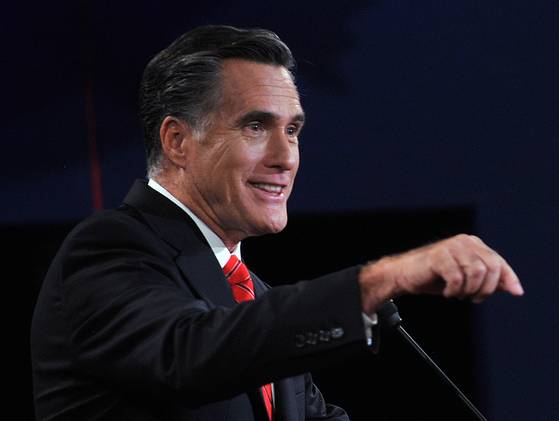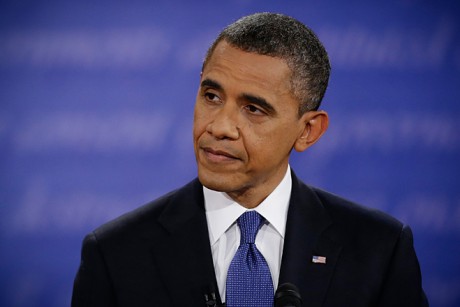 |
| A kinder, gentler Romneybot? |
Romney's performance in the Wednesday-night debate kicked up a brand-new, take-two or -three discussion of his inner core -- if he has one -- akin to a 90-minute episode of "To Tell the Truth," for those boomers like myself who still remember the 50s quiz show. The original required two of the three contestants to defend false resumes in an attempt to stump the panel, provided all told the truth. In my new iteration, all three contestants are Mitt, and the truth is optional.
The denouement each week of "To Tell the Truth" was, "Will the real Mitt Romney please stand up." Indeed. Will he? has he? There is something riding on it besides egg on perennial panelist Bess Meyerson's face. There's maybe the future of the country.
So here we are a few days later, and John Dickerson of Slate comes out with a somewhat predictable "Who's Mitt, Anyway?" sort of article, based on the new Mitt of debate fame, the finally Etch-A-Sketched, more moderate, less scary, even, uh, warm and fuzzy guy you actually would like to have a beer with if Mormons only drank.
Dickerson:
But finding the essential Romney isn’t so simple. The experiment itself is flawed. Voters are being asked to detect the truth from two different acts of artifice. One is a set-piece performance recorded by the television networks. The other was a set-piece performance captured by a member of the catering staff. Both are performances. Like all politicians, Romney was playing to the crowd in both cases. The question is not which one represents the true Romney, but which crowd will he play to when he’s in office.
 |
| Undecided voters caught undeciding. |
Why, of course, should be the ultimate question, but that's understandably harder to get to. From my perspective, he and his running mate Paul Ryan are both heavily Etch-A-Sketched: one, Romney, by himself and his consultants and the other, Ryan, by a beltway press corps in search of someone resembling an intellectual, policy-wonk conservative. Unfortunately but predictably, what you see is most decidedly not what you get.
Here's more grist for the mill: This morning's New York Times headline read, "Romney Claims of Bipartisanship as Governor Face Challenge," which is impartial reporter gobbledegook for Romney lied his ass off. From the article by Michael Wines:
As a Republican governor whose legislature was 87 percent Democratic, Mr. Romney said in Wednesday’s debate, “I figured out from Day 1 I had to get along, and I had to work across the aisle to get anything done.” The result, he said, was that “we drove our schools to be No. 1 in the nation. We cut taxes 19 times.”
How quickly reporters can debunk politicians' statements. But once the propaganda propagates, does it take on a life of its own? Political consultants know the answer: Fuck yeah.But on closer examination, the record as governor he alluded to looks considerably less burnished than Mr. Romney suggested. Bipartisanship was in short supply; Statehouse Democrats complained he variously ignored, insulted or opposed them, with intermittent charm offensives. He vetoed scores of legislative initiatives and excised budget line items a remarkable 844 times, according to the nonpartisan research group Factcheck.org. Lawmakers reciprocated by quickly overriding the vast bulk of them.
 |
| Post-debate conventional wisdom? Dude's toast. No, French toast. |
I got a chuckle but no solace from Andrew Sullivan's blog post, "Rebooting the Romneybot." That this title is not salacious tells a lot about both Romney and our political culture:
The reinvention effort includes softening the edges of Romney, both stylistically and philosophically. The more likable version of Romney was no accident — he worked hours on his smile, his posture and the delivery of his words. The more centrist version of Romney was no accident either — he carefully calibrated his message on taxes, spending and Medicare to broaden his appeal.
...The goal was to overwhelm the president with liveliness and information, to force him to confront the messy details of his economic and fiscal record.Carefully calibrating his message on taxes, spending and Medicare, my ass. He lied, hoping people would lap it up. Over at the Daily Beast, historian Simon Schama let loose on Romney on the falsehoods and on Obama for his dismally dispiriting performance:
As the whoppers tumbled from his smiling lips, Pinocchio Romney’s nose grew so long that it was practically poking out the eye of his mournful opponent. But even had it struck raw cornea, the president would have politely removed the intruding proboscis to say, “Governor Romney, I probably agree that the nation could do with a good eye watering, though we disagree on the manner in which it would be administered,” or some such snappy retort.Romney lies, truth dies is not a lame pronouncement: It's the observation du jour, today as it was yesterday, and so forth. Here's Michelle Goldberg, also of the Beast:
The way Obama kept looking down instead of directly into the camera was maddening. So were his seemingly unrehearsed, defensive answers. But the most painful part was watching Romney lie so brazenly, while over and over again Obama failed to effectively challenge him. Romney repeatedly insisted, for example, that he has no plans to reduce the tax burden on the richest Americans. This directly contradicts the analysis of every nonpartisan expert who has looked at Romney’s plan.
...Perhaps Obama, feeling comfortable in his lead, didn’t want to get down in the muck and call Romney a liar, or perhaps he was just unprepared for the level of deceit on display. Debating someone who is willing to simply make things up is incredibly discombobulating. Regardless, it means that most viewers will be left with a seriously distorted view of what the Republican candidate is proposing. Tomorrow, the fact-checkers will try to correct the record, but the Romney campaign has already decided that facts don’t matter.And so it goes. For the record, I didn't go to see what William Kristol, Jonah Goldberg, Jennifer Rubin, or Fred Barnes had to say about the factual basis of the new Romneybot because they're hardly invested in the truth. They're interested in the fight and its outcome. They're all in for their bot.
Okay, I did go read Charles Krauthammer's column on the debate. Ugh. Read it at your peril.
 |
| Kristol, pointing to his as yet unemployed Romney bullshit detector. |
As Michelle Goldberg titled her Beast report above, Romney won, and the truth lost. There are few mourners for the truth on the right, not while they smell blood. On the left, there's anxiety aplenty about whether Obama can help truth make a comeback. We have a month and three more debates to find out.
| Post-debate polls pile up. (h/t Andrew Sullivan) |

No comments:
Post a Comment